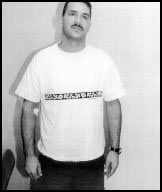NOT THAT IT was right to kill Aaron Roberts, 37-It just wasn’t wrong. That’s the simple answer and usually is. “I was not surprised by the result,” says Roberts family attorney Doug Wilson, “nor was Deloris Roberts,” Aaron’s mother.
The coroner’s inquest jurors who last week decided reasonable force was used by police to end Roberts’ life on May 31 repeated what several hundred county inquest juries have said for 25 years: homicide justified. It’s a message reaffirmed in the last 10 months as well.
In that time, nine inquests were held in King County to investigate deaths caused by, or associated with, the actions of law enforcement and custody officers. Cases varied widely and included a bank robber shot by Bellevue police, a teen who hanged herself at the Echo Glen children’s facility, a man in sheriff’s custody who died from acute heroin poisoning, and a woman shot while fleeing Kent police.
None of the cases got the public attention that Roberts’ case did. But they turned out the same: vindication for the officers.
“No criminal charges were filed in any of these cases,” says Dan Donohoe, spokesman for King County Prosecutor Norm Maleng.
Maleng, this week, is expected to announce whether he will file charges in the Roberts case. But he has yet to file after an inquest jury cleared the officers.
Those cases have included, over the years, victims shot by Seattle police while surrendering, while displaying a toy squirt gun, and while wielding a TV remote control.
Comparatively, Roberts’ case should be easier for Maleng. Roberts was heavily armed, as police like to say, with a Cadillac.
Jurors listened for eight days to an assortment of testimony but were left to base their decisions on the influential word of the only (surviving) witnesses with a close-up view: Seattle police officer Greg Neubert, who hollered “Shoot, shoot!” and officer Craig Price, who did (see “A Shot in the Dark,” Oct. 3).
To the key question, did Price act reasonably to stop Roberts from harming a fellow officer, jurors answered a resounding yes.
Yet no one satisfactorily explained how and why Roberts did what he allegedly did: briefly dragging Neubert along by the wrist one moment, trying to force him out of his car the next, accelerating, braking, shifting, steering, fighting with Neubert, and grabbing Price’s gun as the car went forward, stopped, and went backward.
“When my son was born,” Deloris Roberts noted, “he only had two feet and two hands.” It must have been the drugs he’d taken earlier, jurors were told. On drugs, anything’s possible.
As with other inquests, the official version wasn’t necessarily the correct one. Or the honest one (often it’s just the most favorable one).
A number of witnesses around 23rd and Union saw events differently that night, but disagreed among themselves. Neubert was either in a “fast shuffle” or “wasn’t running” or “was being dragged.” Roberts either said, “Please officer, don’t shoot me, don’t kill me!” or said nothing at all. Conversely, the officers methodically checked off a matching list of details, confirming each other’s version.
Thing is, they may have been telling the god’s honest truth. Forget Roberts’ hands; focus on his foot on the gas pedal. The black motorist’s death may have happened precisely as the two white officers say.
But why, besides historic community/cop distrust, does doubt hang in the air?
Is it because the public believes inquests favor one side? Because cops don’t believe it’s their side? Because neither side thinks it’s fair?
Inquests lack the adversarial blows and wide-ranging testimony usually associated with a fair hearing. What good, some ask, is a court that appears to do everyone an injustice?
“The inquest process puts limitations on the family that make things very difficult,” says attorney Wilson. He never thought he’d get a fair shake. Yet he did feel, in this case, “the bias was greatly mitigated” by the even hands of Judge Barbara Linde and deputy prosecutor Mike Lang.
A few weeks ago, cops attorney Linda Marchese was also a critic of the system. Maybe her boys wouldn’t testify, she said, because of double jeopardy risks. Today?
“I think,” she says, “this verdict clearly vindicates and exonerates them.”
Maybe it does. But after 25 years of assembly-line outcomes, can anyone believe it?








